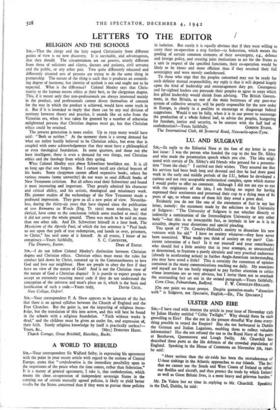RELIGION AND THE SCHOOLS
LETTERS TO THE EDITOR
SIR,—That the clergy and the laity regard Christianity from different points of view is no new discovery. It is inevitable, and advantageous, that they should. The circumstances are sui generis, utterly different from those of solicitors and clients, doctors and patients, civil servants and the public, or any other pair. Two quite differently educated and differently situated sets of persons are trying to do the same thing in partnership. The nature of the thing is such that it produces an astonish- ing degree of harmony, but identity of outlook is not and ought not to be expected. What is the difference? Colonel Mozley says that Chris- tianity to the layman means ethics at their best, to the clergyman dogma. This, if it meant only that non-professionals are always interested mainly in the product, and professionals cannot divest themselves of concern for the way in which the product is achieved, would have some truth in it. But if it is intended to imply that there can be any real division of territory between theory and practice, it sounds like an echo from the Victorian era, when it was taken for granted by a number of otherwise enlightened persons that Christian dogmas must go, but that Christian ethics could be retained.
The present generation is more realist. Up to 1939 many would have said: "Both or neither." At the moment there is a strong demand for what are rather hastily believed to be Christian ethics, but even that is coupled with some acknowledgement that they must have a philosophical or even theological foundation. In some quarters, and those not the least intelligent, there is even a demand for two things, real Christian ethics and the theology from which they spring.
What Colonel Mozley says about Schweitzer bewilders me. It is all so long ago that one forgets. But I cannot recall any clerical boycott of his books. Some clergymen cannot afford expensive books, others for various reasons (some unworthy) do not want to read difficult books of New Testament criticism. But all others read their Schweitzer and found it most interesting and important. They greatly admired his character and critical ability, and his artistic, theological and missionary work. His pioneer studies of the eschatology of the New Testament made a profound impression. They gave us all a new point of view. Neverthe- less, during the thirty-six years that have elapsed since the publication of von Reimarus zu Wrede (Eng. Tr. 191o) most students, lay and clerical, have come to the conclusion (which some reached at once) that it did not cover the whole ground. There was much to be said on more than one other side. And Dr. Schweitzer himself in a later book, The Mysticism of the Apostle Paul, of which the last sentence is "Paul leads us out upon that path of true redemption, and hands us over, prisoners, to Christ," has said some of it himself. At all events, I know of no


























 Previous page
Previous page